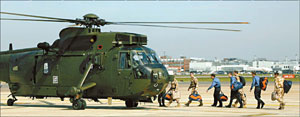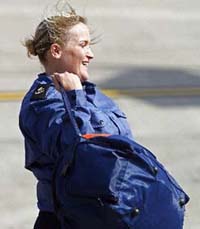| Home / International / International -- News | Tools: Save | Print | E-mail | Most Read |
| Freed Britons Back Home, Standoff over |
| Adjust font size: |
The 15 British military personnel freed by Iran after a two-week diplomatic stand-off arrived back in England Thursday to cheers and questions about the incident and its implications. As flight BA6634 from Teheran touched down at London's Heathrow Airport at 12:02 PM (11:02 GMT), the group burst into applause. Dressed in military uniforms and carrying personal luggage, they briefly posed in a straight line for pictures before they were flown by helicopter to a base at Chivenor in Devon, 320 kilometers southwest of London, for a private meeting with their families, medical checks and debriefing.
The death of four British soldiers in Iran's neighbor Iraq has tempered joy over the return of the 15 marines and sailors, British Prime Minister Tony Blair said. "Just as we rejoice at the return of our 15 service personnel, so today we are also grieving and mourning for the loss of our soldiers in Basra who were killed as a result of a terrorist act," he told reporters as the plane landed. Iranian President Mahmoud Ahmadinejad told a news conference broadcast round the world on Wednesday he had decided to forgive and free the 15 even though Britain was not "brave enough" to admit they had strayed from Iraqi into Iranian waters. The carefully stage-managed performance was seen by some as trying to soften the former Iranian Revolutionary Guard's vehemently anti-Western image abroad. But not everyone agreed. "The bad news for Teheran is that the British people are now more likely to see Iran as the bad guy as a result of this," said Dan Plesch, author and commentator on nuclear proliferation at London's School of Oriental and African Studies. "Your average Briton now will be much more aware that Iran is a potential threat, despite the way it ended," he added. 'Blair's letter of apology' Thursday Iran said the group had been released because British Prime Minister Tony Blair had sent a personal letter of apology over the incident a statement that was "categorically denied" by Blair's Downing Street office. The peaceful end to the standoff, which began when the world's fourth largest oil exporter seized the 15 in the northern Gulf on March 23, prompted a drop in oil prices from recent highs. After the flight left Teheran, Iranian television showed more interviews and images of the group, wearing civilian clothing, drinking tea and clutching colorful gift bags. "The treatment has been great. It will be nice to get back and get home to see my family," said Faye Turney, the only woman in the group. "Thank you for letting us go. We apologize for our actions," she added, wearing a headscarf and looking strained. Even before they had touched down, the post-mortem had begun on what closed-door deals might have been struck and just what it meant for future relations between Iran and the West. "The (EU) presidency hopes that Iran uses this opportunity to find solutions to other issues in cooperation with the international community and the European Union," current EU president Germany said in a statement. (China Daily via agencies April 6, 2007) |
| Tools: Save | Print | E-mail | Most Read |
 |
| Related Stories |
 |
 |
|
 |
| Links |

